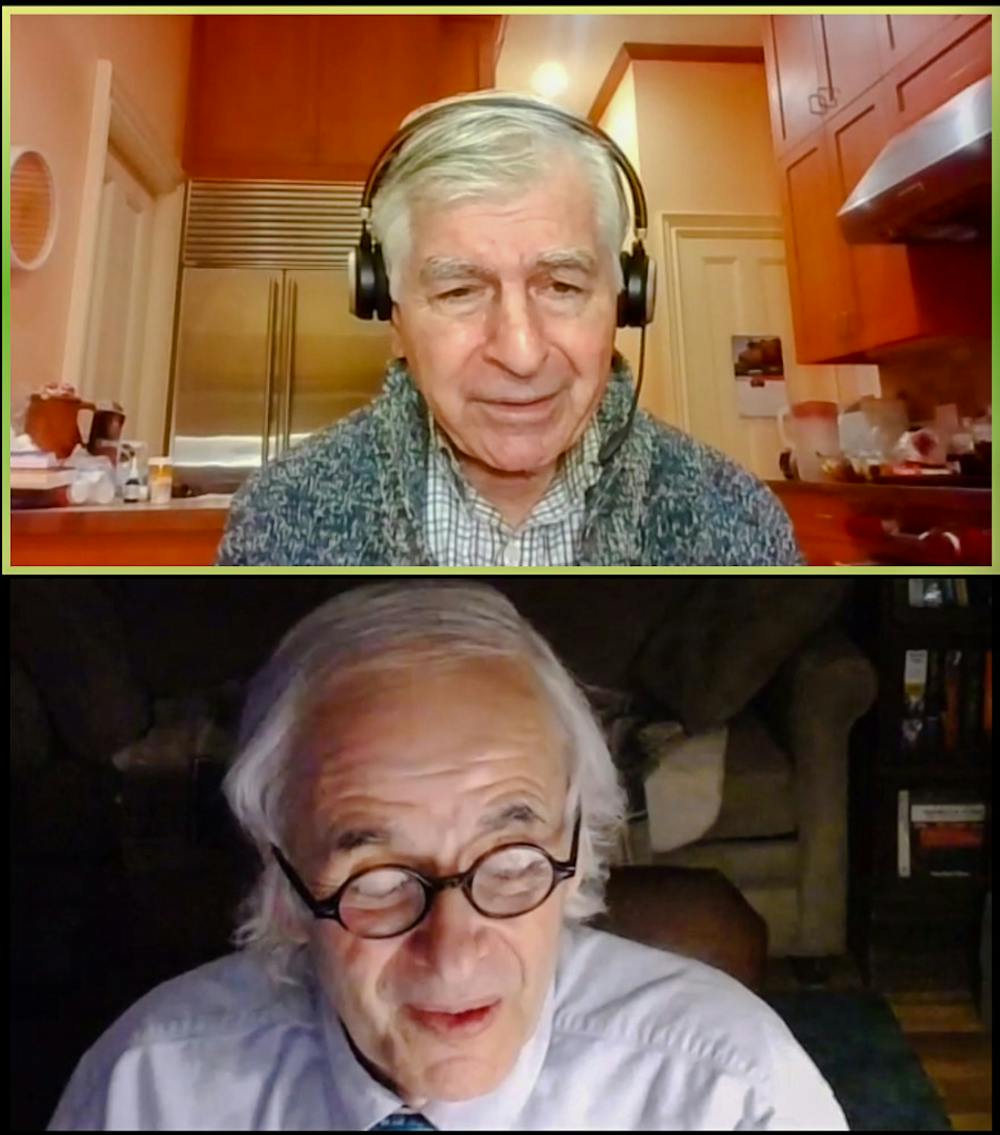When asked what’s at stake in the 2020 election, former Massachusetts Governor Michael Dukakis said: “Just about everything.”
Dukakis — the longest-serving governor in Massachusetts state history and the 1988 Democratic presidential nominee — joined Visiting Professor of the Practice of Political Science Richard Arenberg to discuss the implications of the coming election on democracy, ethics and efficiency in the American political system. The Taubman Center for American Politics and Policy hosted the virtual talk.
“We’re now only about five days from Election Day,” Arenberg said, opening the conversation. By Oct. 28, “more than 75 million Americans have already voted,” he said, describing the 2020 election as the “most consequential election since the Civil War.”
“This is a new, different and very troubling period in American politics,” Dukakis said. “Personally, I hope we can end it in a few days.”
Although Dukakis is a Democrat, he explained that his concerns about President Donald Trump’s reelection and legacy extend across the aisle. In the former governor’s experience as a politician, bipartisan collaboration was “one of the very special things about American politics,” and “it seems to be totally missing” in the era of the Trump presidency.
“It’s all about Trump,” Dukakis said. “He’ll go after Republican governors who don’t agree with him on things, attack and insult them. I don’t understand this.”
Dukakis stressed the importance of “sharing ideas and opinions” and collaborating despite political differences. As an example, he referenced his friendly relationship with Republican Dan Evans, the former governor of Washington.
Arenberg added that it is “very difficult for a democracy to survive without the willingness of the two parties to come together and collaborate,” especially during the COVID-19 pandemic.
Both Dukakis and Arenberg criticized Trump’s handling of the pandemic. “Doesn’t (Trump) understand that this is a collaborative effort, that good people on both sides are doing their best?” Dukakis said.
The pandemic is “getting very close to being out of control,” he added, with “no end in sight.” According to the Centers for Disease Control and Prevention, there have been more than 500,000 new coronavirus cases reported in the United States in the last seven days.
Dukakis said that he has “no doubt” that controlling the pandemic will be Joe Biden’s “top priority” if he is elected. “We can’t get our economy and society working again unless we get serious about dealing with this problem,” he said.
Dukakis added that he believes that if Biden wins, the United States could quickly return to “sense, reality and good government.” But Trump’s reelection would have some “real consequences,” he said. “American democracy can weather” another four years under Trump, “but it will be very, very difficult.”
The former governor also commented on the recent discourse surrounding the Supreme Court in light of Judge Amy Coney Barrett’s Oct. 26 confirmation to the Court despite challenges from the Democratic Party.
While discussing partisanship surrounding the judicial confirmation process, Dukakis said, “to see the Supreme Court become a political plaything on the eve of a very important political election — it’s distressing.”
Dukakis also addressed the prospect of Democrats adding additional seats to the Supreme Court in order to compensate for the new conservative majority on the bench. He cautioned that Democrats should be “careful about this notion that if we change the law and stick liberals on the court, everything will be okay.”
Should there be civil unrest following Election Day, Dukakis said he is confident that the institution of democracy will protect the peaceful transition of power from one president to the next. Earlier this month, Trump notably hesitated to commit to a peaceful transition of power if Biden wins. But Dukakis said even Republicans would oppose such action from the president.
Despite the uncertainty of the pandemic, as well as what Dukakis sees as four years of corruption under the Trump administration, he is hopeful for the future of American politics — whichever way the election goes Nov. 3. “A decisive victory on election night or soon thereafter will go a long way” in safeguarding a fair outcome of the presidential election, Dukakis said.
“What we’re seeing is a huge increase in participation on the part of young people who were pretty absent in 2016 and unquestionably are very, very active in this election,” he said. “It may, in fact, make the difference.”

ADVERTISEMENT




